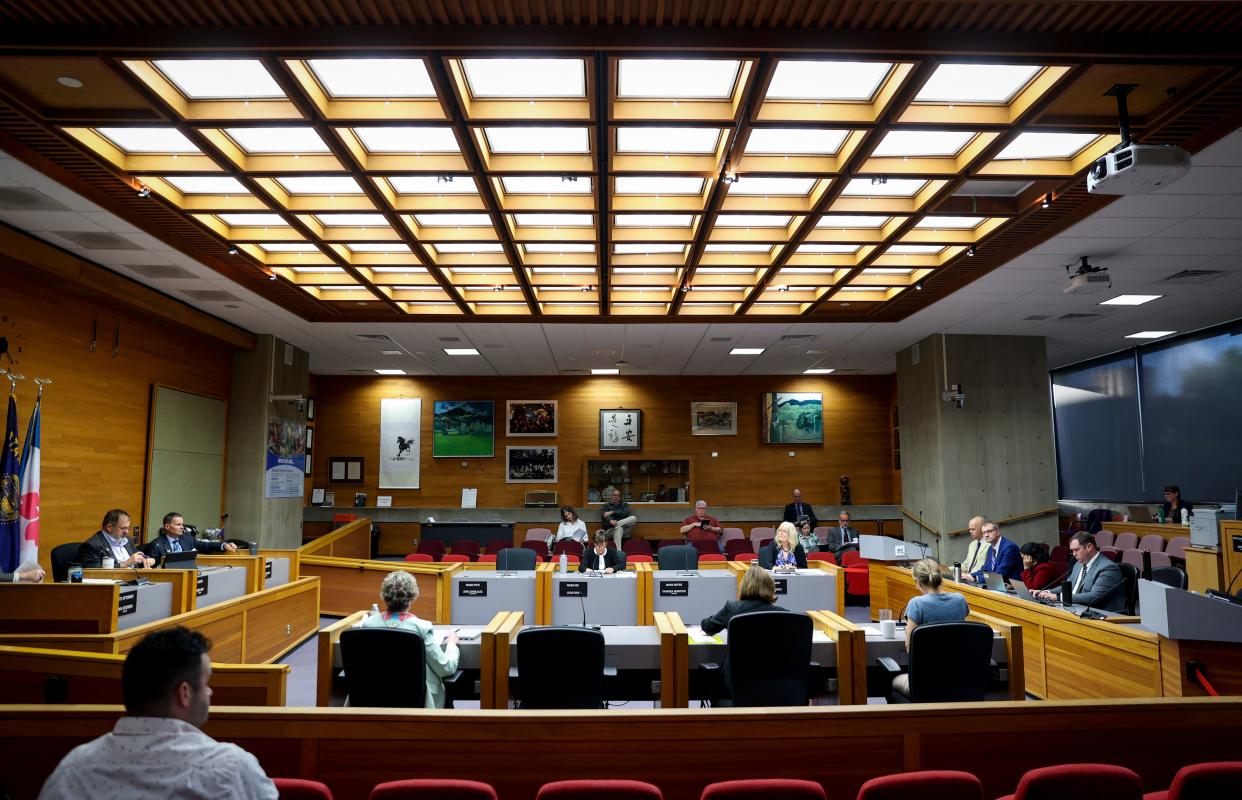Why voters rejected Salem's proposed payroll tax, what city officials plan to do

Salem voters resoundingly rejected a payroll tax to pay for emergency and homelessness services during Tuesday's special election. With the defeat of the tax, city leaders are now working to figure out what's next.
"It's not what we were hoping for, but it certainly was what we were expecting," City Manager Keith Stahley said.
Why did the tax fail?
Before the election, an overwhelming majority of respondents to a Statesman Journal online poll about the payroll tax said they would vote against it.
Many said the .814% tax on wages for all work done in Salem would've been an economic burden on their families.
The tax would have generated $27.9 million annually and cost a person earning the average hourly rate of $29.90 the equivalent of $506.24 a year.
Oregon Business & Industry, a statewide chamber of commerce and trade association, launched an effort to refer the tax to voters, after council passed it in July.
OBI director of political affairs Preston Mann said Salem voters sent a clear and decisive message to city officials with their vote.
After the tax's defeat on Tuesday, OBI President and CEO Angela Wilhelms said there were lessons to be learned from the election's outcome.
"As local governments across the state take stock of their own unique budgets, we urge elected leaders to be mindful of today’s outcome and to work in good faith and partnership with their respective communities when deciding to pursue new revenue," Wilhelms said.
Salem Chamber CEO Tom Hoffert, whose organization vocally opposed the tax, said it would've been a burden on the small business community and local economy.
“An attempt to increase revenue through a tax mechanism will be devastating to the local economy,” Hoffert said in a statement. “The Chamber is actively working on solutions and is eager to be a partner with the city in addressing revenue issues.”
What happens next?
In the wake of the tax's failure, Salem City Council president and member of the pro-payroll tax group Save Salem Virginia Stapleton said the defeat of the tax didn't mean the looming budget deficit suddenly went away.
“The City Council now faces the daunting prospect of cutting millions in services to balance the budget while working with residents across the city to secure another revenue stream," Stapleton said. "We don’t have a choice on securing new revenue. We have to get to yes on something.”
More: Property tax limits, state-owned land: What's to blame for Salem's budget deficit?
Stahley underscored this.
"The need hasn't changed," he said, referring to the multi-million dollar budget deficit projected over the next five years.
Stahley said revenue options could entail a levy, such as a library or public safety levy, or increased or restructured fees charged to residents and businesses.
On Nov. 27, city council will meet to discuss the creation of a revenue task force, which will explore these options.
After the election, members of Save Salem and budget committees said they were committed to finding new funding and doing the work needed to keep the city from needing to make austere cuts.
"Despite this loss, we are in this together," Dr. Irvin Brown, vice-chair of the Citizen Budget Committee said. "Time to roll up our sleeves and get back to work.”

Budget meetings will be held in early 2024 to adjust the current fiscal year spending plan, and cuts to services could begin as soon as June.
Shortly after the interim budget meetings, the regular budget meetings will begin to discuss the fiscal year 2025 budget.
A backup plan already was in the works months before the election. City officials have been meeting to discuss potential cuts, which could include closing two fire stations, closing libraries, shuttering homeless services and cutting jobs in the next five years if more revenue is not generated.
Stahley said because of these discussions, the city is in a good position to move forward.
In the most recent work session on Oct. 25, Salem City Council and staff explored different scenarios. One included closing the library to avoid all cuts to public safety services. Another entailed cutting six police positions and closing the library as part of an effort to fund all sheltering services.
Other proposals were less acute and included more across-the-board cuts.
"We are working with a zero-sum game here," Stahley said during the Oct. 25 meeting. "So if you put money in one place, you are going to have to take it from another place."
The city might be able to avert layoffs in the next year by not filling vacancies. But without new revenue, it could turn to layoffs at the library, fire stations and police department, officials said in a September overview of possible cuts.
As soon as 2024, the West Salem branch of the library could be closed, the city funding for the microshelters and the emergency warming network shelters could be pulled, and drinking fountains, splash pads and irrigation throughout the parks system could be turned off.
"There're no good options here," councilor Trevor Phillips said during the meeting. "We are just looking for the least terrible."
In a statement, Stahley outlined the timeline of events in the coming months to balance the budget:
On Jan. 10, the city’s 18-member Budget Committee will consider the five-year forecast of available revenues and costs to provide services.
As early as Feb. 12, the City Council will consider adopting a mid-fiscal year amendment to the FY 2024 Budget that decreases to expenses to conserve the city’s General Fund balance.
Staff will recommend, a task force be created in January 2024 to consider options to raise revenues for General Fund services.
In April and May 2024, the Budget Committee will consider the FY 2025 Budget. This Budget will include further reductions to city services. Without additional funding, among other reductions, Salem’s micro-shelter village communities will close and other sheltering services will be reduced, hours at the Salem Public Library will likely be reduced, and operational support for Salem’s parks will be reduced.
For questions, comments and news tips, email reporter Whitney Woodworth at wmwoodworth@statesmanjournal.com call 503-910-6616 or follow on Twitter at @wmwoodworth
This article originally appeared on Salem Statesman Journal: What happens now that Salem Oregon voters rejected the payroll tax

